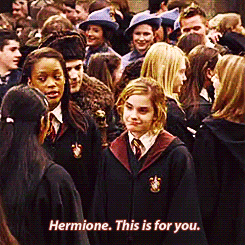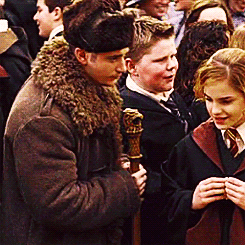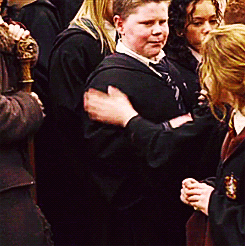Note
Your thoughts about James and Snape were seriously well written, I loved them. You put into words what my mind never managed to, thank you!
Hi.
You’re much welcome. The vilification of James to prop up Snape is honestly one of my worst HP fandom pet peeve (that and the random Ginny and Ron hate).
Thing is, I don’t even dislike Snape as a character, I think he was a terrible human being and I dislike him strongly as such. But as a character he was interesting, fascinating and well written and I did enjoy reading him quite a lot.
I did think Snape was brave, I think he loved Lily even though he loved her wrong. I think he was essential to Harry’s success and I actually don’t even dislike Harry naming his son after him because it’s in character of him to be the kind of person who would forgive an move on. By giving “Severus” as a middle name to his son, Harry showed that he was a much better person than Snape ever was who, unlike him, could never let go of the past.
That being said, it doesn’t excuse any of what Snape did. Snape showed prejudice toward Muggleborns even before he went to Hogwarts, he was a bully and deep into the Dark Arts at school, he then joined Voldemort and would have happily remained a Death Eater if he didn’t realize that the one year old child who’s life he just sold out without remorse was Lily’s. When people talk of the supposed respect Snape had for Lily then I legitimately wonder if they have read the same book I did. Him calling her a Mudblood isn’t respect. Him spreading hatred toward everyone of her birth isn’t respect. Him selling out her child and not caring about said child’s death even after he realized it was hers isn’t respect. Him then treating Harry terribly and bullying him at school as a grown man isn’t respect. It’s everything but. Snape loved Lily obsessively, but he did not respect her, this why she stopped being friend with him to start with, because she realized he had no respect for her an stood up for herself (which she was right to do and 100% justified in doing - even worst than the James hating Snape apologists are the Lily hating ones. It’s clear that what happened during Snape’s worst memory was merely the last straw and her ending their friendship was due to an accumulation of all his questionable attitudes and beliefs).
Snape spent his life bitter and blaming James / Harry /the world for losing Lily when he lost her all by himself. He is the sole reason why their friendship ended. He ruined his own life by choosing the Dark Arts and his bigoted ideas over her. James isn’t even relevant as to why their friendship ended, Lily only fell in love with him two years later.
The sad part about all of that, about all the wrong choices Snape made, is that he never really learned. He did show some shadow of understanding from time to time, but it was never enough, he never truly learned. All his life remained the same sad bullying douche-bag who didn’t understand what Lily was trying to tell him all those years ago in front of the Gryffindor common room when she asked him why she “should be any different”. People always romance the “Always” line, romance the fact that he did everything for her, but to me it just shows that Snape still hasn’t learned. He still doesn’t care about doing what’s right just because it’s the right thing to do, he is still only doing it because it’s her child and therefore because it’s her, just like he only apologized back then because it was her. He still doesn’t get it, hence why I will maintain that Snape was a bad person who did the right thing for the wrong reasons. It does make him a tragic anti-hero and a tremendously complicated and interesting character, but it doesn’t make him a good person. Nothing will ever justify a grown man bullying children to the point of tears or to the point of becoming their worst fears for starter.
I find it frankly puzzling that this fandom has such a hard time forgiving James for being immature at the age of fifteen despite all evidence even prior to maturing that he was still a good kid with good morals who always knew right from wrong behind it all but can easily forgive Snape for selling out a baby’s life, going around Hogwarts being a bigoted bully terrorizing Muggleborns and joining Voldemort fresh out of school.
It just doesn’t make sense; it’s okay to enjoy Snape as a character, but pretending that he was nobler than he was however, will always make me want to claw my eyes out and pretending that he was a better man James simply doesn’t hold up upon closer textual examination.
55 notes
·
View notes
Photo

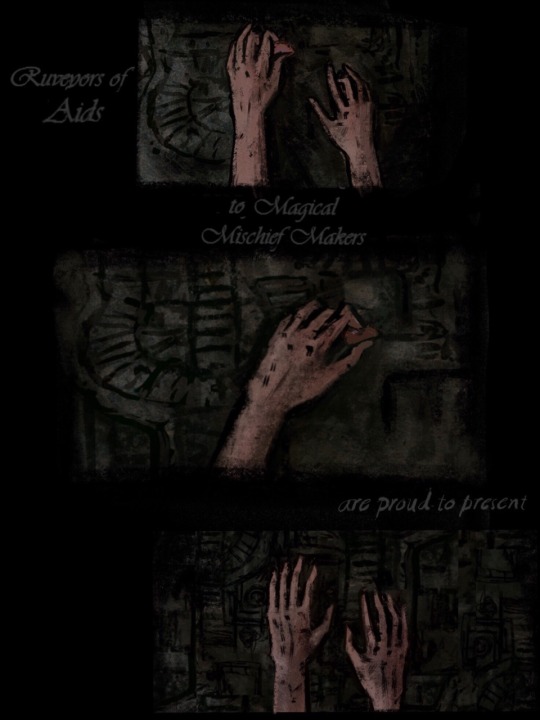
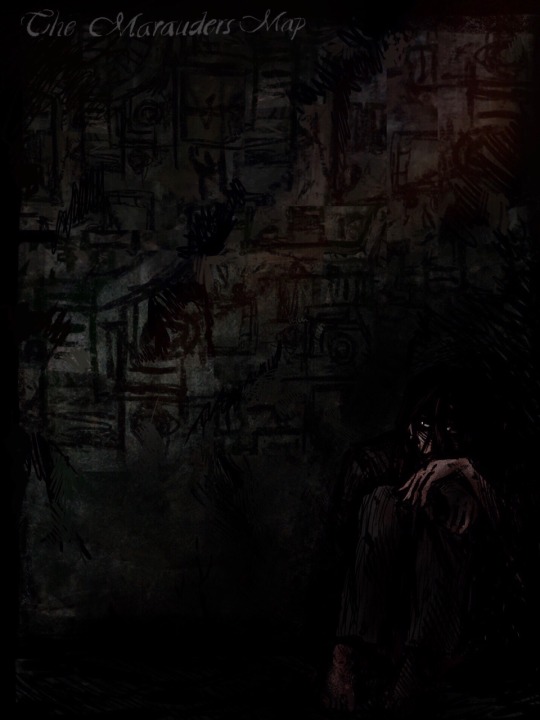
“Always the same words: ‘He’s at Hogwarts…he’s at Hogwarts.’”
2K notes
·
View notes
Text
An interesting thing to explore when analysing Sirius’s rage towards Peter, is his personal sense of hurt at the betrayal (outside of James and Lily’s murders). The tragedy of the situation is that he considered Peter a friend. Although Sirius never once mentions the harm Peter has done to him ( the little thing of wrongful imprisonment) and throughout the scene frames his anger as wanting justice for Jily and mainly to protect Harry (which is certainly his prime motivation).
There is just something about the way he rips into Peter, “cringing piece of filth”, “Stinking skin,” and my personal fave “there’s enough filth on my robes without you touching them,” that has so many layers.
It also reminds me of “shame of my flesh,” and is potentially another similarity with Walburga. Wherein they both resort to awful insults to mask how much someone has wounded them.
441 notes
·
View notes
Note
That “judge a man by how he treats his inferiors, not his equals” quote is… really ironic coming from Sirius. I love the man, but he’s not exactly a shining example of that quote.
But that is kind of the point of it, no? @artemisia-black has explored how the immense privilege of his birth renders him to truly understand Kreacher's position as a slave, because of his family wounds surrounding his mother. Kreacher, a being he owns, is a proxy for Walburga for him, and while he idealogically understands it, emotionally, in OOTP, he is in the site of immense hurt: Grimmauld Place.
Linking Artemisia's metas that addresses this:
The Shadow of being a Black
A Victim of System He was born into
92 notes
·
View notes
Photo

write sirius as angsty and rebellious and brash and impulsive as you want but pls can we stop with ‘conflicted over the dark arts/morals’ trope bc he was literally so vocal in his hatred for the dark arts that he was the LAST person you’d have thought would turn to the dark arts
4K notes
·
View notes
Text
I feel like people underestimate how much Remus and Sirius would commiserate with each other after POA. They both understand what it is like to have almost the entire wizarding world hate them, as well as having the law against them. They both understand that you sometimes have to do what you have to do to survive. ‘Sirius forgave Remus too easily’ ‘Remus forgave Sirius too easily’ no. I think it’s more nuanced than that. Even if u don’t ship them I think they are deeply good friends who immediately fell into the comfort of each others company for a number of reasons. They do get each other. AND Sirius understands that Remus has certain limitations in his help for Harry and Sirius because he’s disabled and discriminated against and living in poverty. To say Remus doesn’t deserve Sirius is a disservice to Sirius’ Character, empathy and intelligence. He understands that he and Remus have different social statuses, and then he especially understands after being in Azkaban, on the run, framed for a crime he didn’t commit, hated and shamed by most of the world. Give Sirius some credit.
541 notes
·
View notes
Text
Hot take: the movies ruined the Trio’s chemistry and relationship from the first scene on the Hogwarts Express. Or if not ruined, they were a warning rattle regarding Kloves’ bad habits. The following is a likely incomplete list of changes/omissions from this very important scene, divided by each of the three main characters:
- Book Harry does not buy the whole trolley, but only one of everything so he can try it all. He does not whip his money out in front of Ron, but makes his purchase in the corridor. Harry instantly tells Ron what little he knows about the night he got his scar and about how awful the Dursleys are, even sharing about how he also grew up with nothing but hand-me-downs, reassuring him that he does not look down on him for being poor. He relentlessly picks Ron’s brain on what to do in everyday life as a wizard. He even tries claiming that Ron’s spell worked slightly since “Scabbers’ whiskers are a bit lighter” to keep Ron from worrying about possibly not being a Gryffindor like his brothers and parents.
- Book Ron doesn’t even believe Harry is that Harry until he confirms it to him, he initially thinks the twins are putting him on (the twins help Harry put his trunk up and see his scar when he wipes his brow). He doesn’t cry out “Wicked!” when Harry shows his scar to him, he just stares at it, asks if he remembers anything and says “Wow”, then looks away in self conscious embarrassment. He spills all of his insecurity about being in his brothers’ shadows and his frustration at his poverty to Harry almost immediately. He is at first shocked, then impressed when Harry mentions Voldemort’s name. He reassures Harry that he’ll catch on quickly enough even though the Dursleys hid magic from him for all those years. He initially declines to share in Harry’s sweets until Harry insists that he does. He is not eating and talking with his mouth full when Hermione is with them. Ron is the one who tells Harry that Gringotts was robbed even before they arrive at Hogwarts. You know, like an actual citizen of the Wizarding World would! Ron starts educating Harry on Quidditch, well before McGonagall drafts him as a Seeker. After the (book-only) scuffle with Malfoy and his goons, he fills Harry in on how Lucius was Voldemort’s flunky.
- Book Hermione abandons Neville when she sees Ron about to perform magic (fascinated by Ron already, Hermione?) and sits down across from him, making herself an equal when he tries the fake spell George told him on Scabbers, rather than standing in the doorway to look down on him. She gives a full paragraph-long, breathless speech to Harry and Ron about her fascination yet limited experience with magic before she even introduces herself. She does not sneer at Ron when he introduces himself to her does not give a haughty “Pleasure”, and he’s not stuffing his face while talking to her because he’s not a complete buffoon. Hermione does not recognize Harry on sight (she identifies him instantly in the movie, starting a VERY bad movie habit of Hermione knowing things she REALLY should not, no matter how many books she reads), but rather she chatters on about how she read all about him once he introduces himself. Hermione does NOT repair Harry’s glasses. She then gives another long, breathless, anxiety-fueled lecture on her preferred house before finally deciding to get back to Neville and his Trevor problem. She then returns to scold them about the Malfoy incident and properly annoy Ron for the first time.
So yes, one of the core foundations of Harry and Ron’s bond was glossed over. I mean, these two boys shared most of their deepest fears and hurts within minutes of meeting.
Harry’s eagerness to even have a friend to share candy with was downplayed. Ron is almost depicted as a leech in the movies when in the books he is almost always extremely uncomfortable with accepting anything of monetary value from Harry, starting with the candy.
Ron’s decency and goodness are largely taken away and he is instead a silly, gluttonous, incompetent oaf.
Hermione’s anxiety, rudeness and at times dreadful social skills are turned WAY down. They don’t even have poor Neville standing there abandoned because Hermione ditched him to observe the failed Yellow Rat spell and lecture Harry and Ron twice. They only have her show her anxiety during the sorting ceremony when they have her talk to herself, which is ironic since in the book she LEAPS to the stool and jams the Hat on her head.
So, the warning signs were there from the beginning. The beautiful relationship and balance of the Trio, one of the very cores of the series, was torpedoed the very first time they met on screen.
Thanks for the submission. I totally agree
620 notes
·
View notes
Text
movie harry: no you’ve made a mistake i mean i can’t be a wizard i’m just harry
book harry: this is literally a mistake because i haven’t been able to turn my asshole aunt and uncle into warty toads even ONCE
1K notes
·
View notes
Text
Sirius Black managed to enchant a motorcycle to fly at the age of twenty.
Managed to become an animagus at the age of fifteen.
Managed to plot an unplottable building which also kept track of every person, polyjuiced or otherwise in the said building.
Managed to enchant two mirrors to face time with his best friend and developed an amazing form of communication.
Was touted as one of the most brilliant students by two supremely intelligent professors.
Joined the not-so-secret society to fight the most evil Dark Lord of all times at the age of eighteen.
Became the bait for his best friend and his family by pretending to be the secret keeper even though he knew all the death eaters will target him for information.
Stayed sane after twelve years of Azkaban.
Stayed sane after sixteen years of Walburga Black.
Rejoined the not-so-secret society even after he had been wronged by all its members and was mocked and belittled by many of the members.
Tried to protect his godson from the moment he was born. His last conversation with Harry was asking him to leave and be safe.
He was the only adult Harry could completely rely on and was still there for Harry even with his shit mental health.
Defeated death eaters in the DoM even though he was years out of practice.
But yeah, sure, Sirius was a dumb jock with no skills or academic prowess or sensitivity. He was, for sure, a bad influence on Harry compared to the other amazing role models Harry had.
1K notes
·
View notes
Text
Oliver Wood before every Quidditch match:
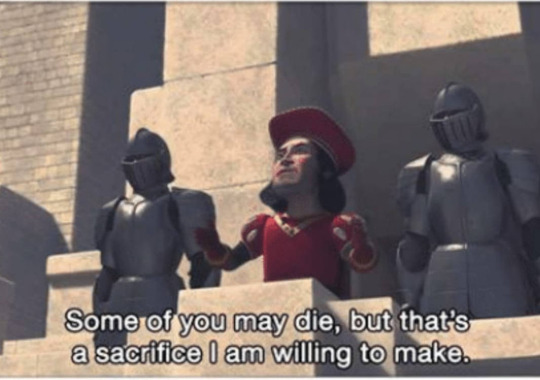
228 notes
·
View notes
Photo
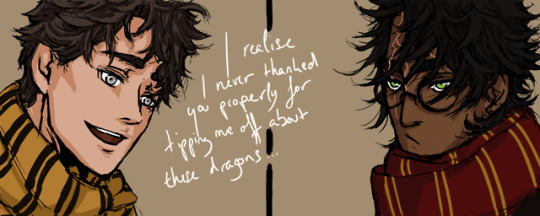
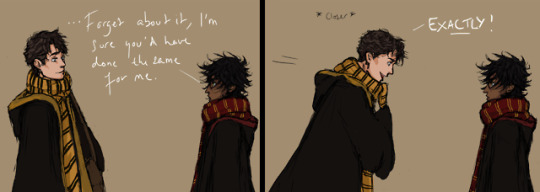

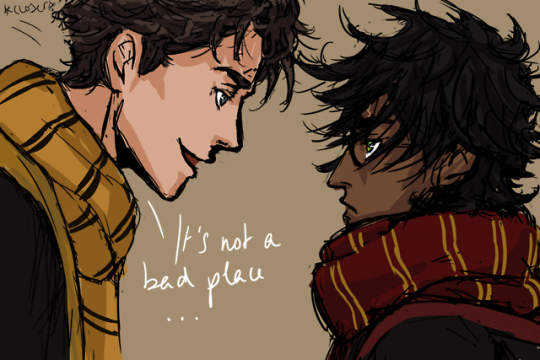
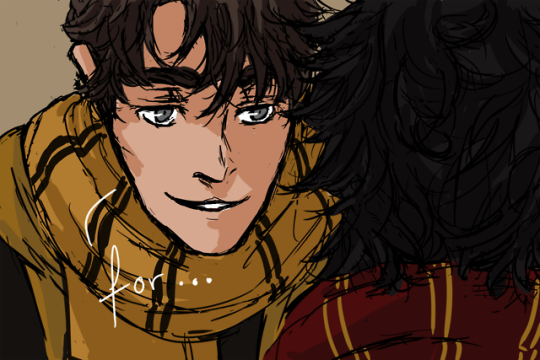
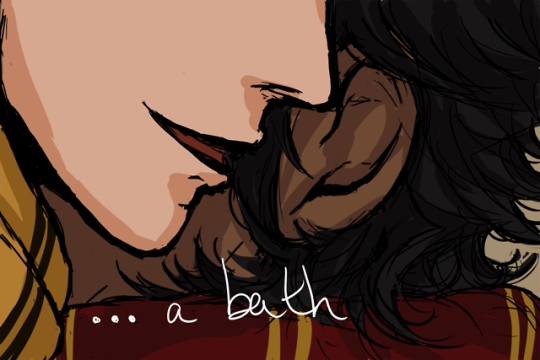
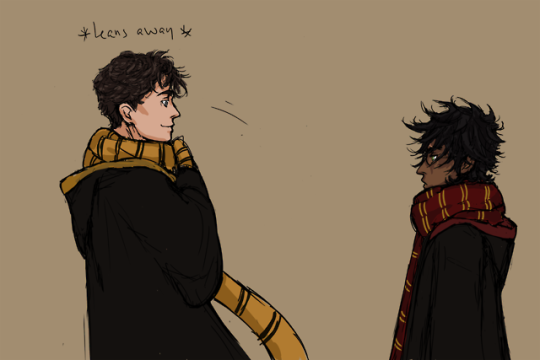

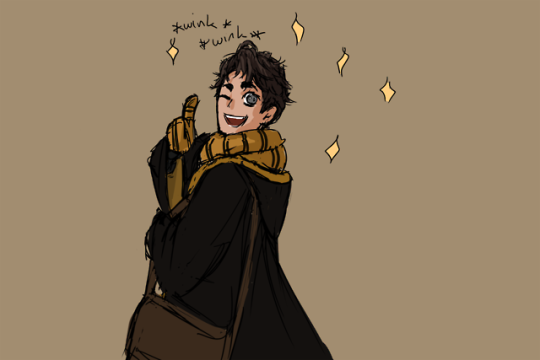
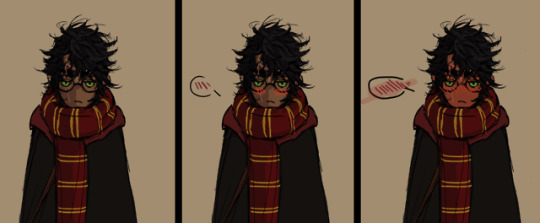
Harry Potter and the Bisexual Awakening - Part One of Three (Part 2+3)
A very slight adjustment to That Scene featuring a smol grumpy Harry and a tol, very helpful Cedric.
(And a dodgy use of the dialogue from the movie mostly, too)
29K notes
·
View notes
Text
The Resurrection Stone Scene: Culmination Of Harry's Emotional Arc

The series biggest themes surround death and Harry coming to terms with his parents' death is arguably his biggest emotional arc. I have argued in my meta about Harry before that he has passive death wish and morbid fascination with the dead. This is obvious in his desire for the Resurrection stone while Ron and Hermione choose other Hallows, his obsession with Mirror of Erised (to the point he feels feverish) until Dumbledore intervenes, him almost wanting to fail to learn a Patronus because he wants to hear his parents voices,the scene at the grave where he almost wishes he was "lying under the snow" with his parents and that possession scene in OOTP, where he wishes to die so he can be with Sirius. Harry has, in many moments, shown a raw desire for death - in ways that actually scares Hermione and makes Ron uncomfortable as evidenced by their reaction when he tells them why he wants the Resurrection stone.
Harry's fascination with the dead isn't surprising - this abused and neglected boy learned in PS that his parents fought to protect him. Essentially they loved him so much, they died for him and Harry feels robbed of that life, a life with parents who loved him dearly (reference his narration in HBP, where he wonders what life would have been like if Neville was the Chosen One).
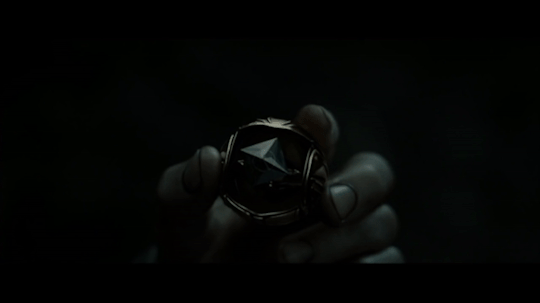
So accepting his parents and parental figures' deaths and choosing to return to life - a life of sorrow, pain, and trauma when he could have just gone "on" (or had "an out" as he screamed in OOTP) - is one of Harry's bigger heroic decisions. To come to a point that Harry can ask his parents' murderer to feel "remorse" in an attempt to save his soul, Harry needed to see and hear things he always wanted to hear from the people he loved.
So, the scene starts:
"You've been so brave"/ "Stay close to me"

LILY: While in life, Harry knows a lot more about James than Lily, it is interesting whenever she appears in any form, Harry is looking at her the most ("I will be back" Harry says, tearing his eyes from his mother's face in PS/ and once again in DH, he couldn't stop looking at her: "his eyes feasted on her"). She is his mother, the one who loved him so much, it magically manifested as a protection that gave him 17 years of life. Her love is always there as safety blanket - so even when his father disappointed him in OOTP, he is comforted by the idea that his "mother had been decent". She is his ultimate protector and this is why he asks her : "stay close to me" while she is gently affirms, "you've been so brave". And unsurprisingly, it is this sacrifice that lives on in Voldemort that gives Harry a choice - a choice to return to the living. After spending much of the series trying to be like his father, Harry embodies his mother by invoking sacrificial magic for Hogwarts fighters. But his embodiment of his mother is not an impulsive brave decision, his walk to his death is far more intentional than hers - as the book narration says, "it's a cold blooded walk to his destruction".
"You are nearly there, very close, we are so proud of you" / "Until the very end"
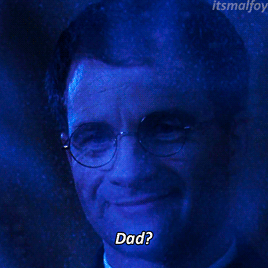
JAMES - his father, the man he looks like, flies like, and tries to root his identity in. Harry spends most of the books trying to live up to the ideal of his father. His Patronus is an embodiment of his father ("Prongs rode again last night"), and it is James' bravery that gives Harry comfort at the traumatic night in the graveyard and makes him want to stand up and fight Voldemort: "He was not going to crouch like a child, he was going to die upright like his father" (as Voldemort taunts him: "now you face me like a man..like your father, straight backed and proud").
James is catalyst to lot of Harry's growth. Harry making an active choice after being horrified by his father's behaviour in SWM, wondering "did he want to be like his father anymore?" is an important character moment for him. He reconciles his view of James, humanises him and thinks of him with "a rush of pride" in HBP as the man who walked into an arena to fight with head held high. So, Harry hears from the father he tried for so long to embody and then surpass in moral character - that he is proud of him and that he will be there to protect him "until the very end".
Here is a meta by u/metametatron4 that tracks Harry's feelings about his father and Snape in detail. Read it here.
"Dying? Not at all - quicker and easier than falling asleep" / "We are a part of you - invisible to everyone else"
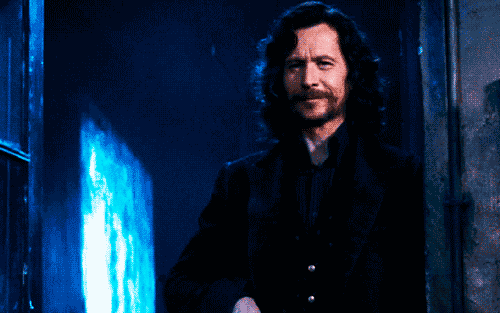
SIRIUS - While Lily and James affirm how far Harry has come, Sirius as the parental figure Harry had in life offers him words of comfort when Harry asks if dying hurts.
This comfort has an added layer, knowing Harry's often violent response to Sirius's death. His reaction to his death has been attempting Crucio on Bellatrix, trashing Dumbledore's office in OOTP, along with other stages of grief. At the end of OOTP, Harry is a mess of unfocused grief and rage - one that he will actively repress in HBP. He avoids talking about Sirius until he thinks the person he is talking to is as invested in Sirius - he brings up Sirius with Buckbeak/Witherwings or Tonks, who he mistakenly assumes is depressed about his death. The biggest indication of how much Harry is really repressing his feelings about Sirius's death is his reaction to Mundungus stealing from Grimmauld place. He lifts Mundungus with one hand, chokes him until he turns blue while threatening him with a wand. He had to be magicked off Mundungus because he, terrifyingly, showed no inclination of stopping despite Hermione screaming at him to do so.
The other time he reacts badly is Lupin's scene in DH. The first person he thinks of when he says "Parents shouldn't leave their kids" is Sirius. He sees image of Sirius falling through the veil, followed by Dumbledore. His reaction to Lupin abandoning his child is powered by the unprocessed grief and rage of the deaths he has witnessed, of parental figures robbed from him. And then, of course, his violent impulse to break Bellatrix's wand with the sword of Gryffindor once Hermione points out that the wand killed Sirius. His violent reaction to his death is due to lack of closure.
This is why it is important that Sirius tells him that dying doesn't hurt, because it would have eased Harry to know that Sirius isn't in pain. And he assures "we are a part of you" - so even though there was no body to mourn and Sirius just effectively disappeared - Sirius is still part of him.
"He'll want to be quick, he wants it over"/ "I am sorry too. I am sorry that I will never know him...but he will know why I died and I hope he will understand. I was trying to make the world in which he could live a happier life"
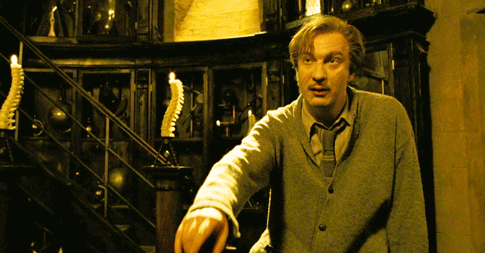
LUPIN - Lupin, like Sirius, also offers comfort by telling him that death will be quick because Voldemort wants to finish it too. It's interesting to me that Lupin is the character that says something that arms him for the future - should he choose to have it ("I'll tell him to follow his instincts which are good and nearly always right" Lupin says earlier in the book).
Lupin is a mentor, a bridge and by DH, a warm friend - he was the one who taught Harry the Patronus charm (a gateway to connection with his father + something that protects him) and it's Harry's trust in Lupin that makes him willing to hear Sirius out at the end of POA, thereby connecting him to a very important relationship. He gives Harry tools to equip him to best live out his life. And once again, Lupin acts as a bridge to Harry's life - he tries to take away Harry's guilt from his own death and leaving behind Teddy. Knowing that Harry survives, this is important for Harry to know so he can live with himself as he takes on godfather role to Teddy.
At the end of this scene, Harry drops the stone, ready for his death. And the fact that he chooses not to go back to it without much inner struggle after the Battle of Hogwarts is a marked shift and beginning for him.
455 notes
·
View notes
Text
Harry [uses the fireplace to call Sirius and Remus after Snape’s Worst Memory]: Was my dad like… A dick?
[At the same time]
Sirius: Yes
Remus: No
[look at each other, then again at the same time]
Sirius: No
Remus: Yes
26K notes
·
View notes
Text
Nearly Always Right: Remus and Harry
By @thecat-isblogging-blog , me, featuring inputs from @dragonlordette
I have talked about Harry and Remus' relationship before in Resurrection Stone meta, where Harry sees Remus as a mentor. A mentor who consistently equips him with tools - his favourite subject (DADA), his strongest spell (Patronus), a connection to his father and godfather. But there are themes in their conversations in POA that sets off seeds in Harry's arc. This conversation for example:
Harry sat stunned for a moment at the idea of someone having their soul sucked out through their mouth. But then he thought of Black.
"He deserves it," he said suddenly.
"You think so?" said Lupin lightly. "Do you really think anyone deserves that?"
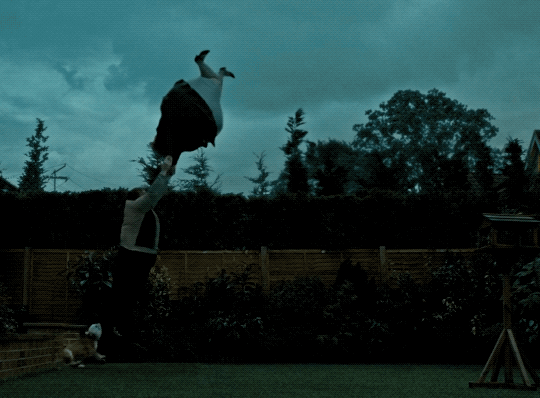
From the beginning of Prisoner of Azkaban, the moral theme is "do bad people deserve bad things done to them". It starts with Uncle Vernon saying Sirius deserves the death penalty:
"When will they learn," said Uncle Vernon, pounding the table with his large purple fist, "that hanging's the only way to deal with these people?"
And, of course, the delightful Aunt Marge about Harry's case in "St. Brutus' Secure Centre for Incurably Criminal Boys":
"Do they use the cane at St Brutus' boy?" she barked across the table.
"Er-"
Uncle Vernon nodded curtly behind Aunt Marge's back.
"Yes," said Harry. Then, feeling he might as well do the thing properly, he added, "All the time."
"Excellent," said Aunt Marge. "I won't have this namby-pamby wishy-washy nonsense about not hitting people who deserve it. A good thrashing is what's needed in 99 cases out of hundred. Have you been beaten often?"
[ Quick note, because I can't resist pointing out more connections the book sets up between Harry and Sirius from the beginning, apart from them being in innocents in these instances:
"No need to tell us he's no good," snorted Uncle Vernon, staring over the top of his newspaper at the prisoner. "Look at the state of him, the filthy layabout! Look at his hair!"
He shot a nasty look sideways at Harry, whose untidy hair has been a source of great annoyance to Uncle Vernon]
Justice and Mercy
Harry completely rejects the Dursleys as caregivers in this book by running away and he gains a mentor figure and a godfather in this book. The mentor, asks him a moral question that sets up an arc: "Do you really believe anyone deserves that?"

The question sets up seeds of mercy that Harry grants not only Peter, but also makes him the deliverer of justice to innocents: Sirius and Buckbeak. He drives the Dementors away from Sirius with a powerful Patronus, a spell Remus taught him and frees Buckbeak, delivering the justice promised at the beginning of the book.
Another notable factor is that Remus didn't answer the question for Harry (although it's clear he has his own feelings about it, especially since he brought up the idea of Sirius getting the Dementors' Kiss unprompted - a first for him in a book). He is opening space for Harry to process what he is thinking and feeling by asking the right questions, and trusting that Harry will make the right decision.
In the Shrieking Shack scene, both Remus and Sirius defer to Harry's judgement on what must be done with Peter. Harry also similarly rejects Remus' stance in Deathly Hallows about using Expelliarmus on Stan Shunpike - "I won't blast people out of the way. That's Voldemort's job."
In the final book of the series, Harry will come to a position where he will grant mercy to many: Draco, Snape, and even Voldemort. Have a look at how he reacts to Voldemort's mutilated soul:
He was afraid of it. Small and fragile and wounded though it was, he did not want to approach it. Nevertheless, he drew slowly nearer, ready to jump back at any moment. Soon he stood near enough to touch it, yet he could not bring himself to do it.
And Harry does not believe that Voldemort deserves it, a mutilated soul, stuck helplessly in a limbo and unable to go on. He offers Voldemort a chance to heal his soul:
"But before you try to kill me, I'd advise you to think about what you've done... think, and try for some remorse, Riddle..."
"What is this?"
Of all the things Harry had said to him, beyond any revelation or taunt, nothing had shocked Voldemort like this. Harry saw his pupils contract to thin slits, saw the skin around his eyes whiten.
"It's your one last chance," said Harry, "it's all you've got left...I've seen what you'll be otherwise...be a man.. try...try for some remorse..."
[Another note: a soul is sacrosanct in the series. That specifically Voldemort's mutilated soul being stuck and unable to move on, and the question of whether Sirius "deserves" to be rendered soulless - it is a strong thread in the series, and as @artemisia-black pointed out to me, in keeping with ideas of annihilationism: "hell is not existing"]
The Idea of Shame
Another theme that comes up prominently in conversation between Remus and Harry are the ideas of shame (and self loathing).
"Why? Why do they affect me like that? Am I just-?"
"It has nothing to do with weakness," said Professor Lupin sharply, as though he had read Harry's mind. "The Dementors affect you worse than the others because there are horrors in your past that the others don't have. (...) The worst that has happened to you Harry is enough to make anyone fall off their broom. You have nothing to feel ashamed of. " - POA
Remus picks up on Harry's feelings of embarrassment and insecurity and just like how Remus plants the seed of justice and mercy in Harry's mind, he also starts it with getting Harry to be kind to himself. Harry feels really vulnerable and insecure about "weakness", and Remus gets him to forgive himself for it before he even fully articulates that he shouldn't feel that way.
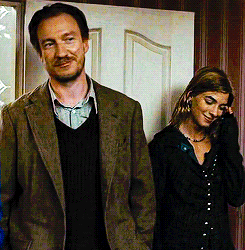
The roles reverse in Deathly Hallows, and Remus runs to Harry with his deep rooted shame and self-loathing:
"How can I forgive myself, when I knowingly risked passing on my own condition to an innocent child? And if, by some miracle, it is not like me, then it will be better off, a hundred times so, without a father of whom it must always be ashamed!"
(...)
"If the new regime thinks Muggle-borns are bad," Harry said, "what will they do to a half-werewolf whose father's in the Order? My father died trying to protect my mother and me, and you reckon he'd tell you to abandon your kid to go an adventure with us?"
Harry, of course, can't solve Remus' problems or his own internalised shame and self-loathing due to the stigma he faces as a werewolf in the wizarding society. But Harry can remind him what's important - the feelings of the child that will be left behind ("Parents shouldn't leave their kids unless they've got to").
And Remus gets the message, and is grateful for it - and he names Harry godfather to Teddy in honour of it.
Like many mentor figures and fathers Harry surpasses in the series as part of his arc (James, Sirius, Dumbledore), Harry surpasses Remus as well and Remus chooses to display trust in Harry's moral compass and instincts:
"I'd tell him to follow his instincts, which are good and nearly always right," - Remus Lupin, Deathly Hallows
228 notes
·
View notes
Text
Part three: Sirius Black, traditional masculinity and mental health.
Trigger warning: discussions of PTSD
Part three : Sirius: Grief, guilt, rage, and responsibility
Here’s part one and part two.
Sirius and his sense of responsibility and guilt
Although Sirius shows a high level of recklessness and disregard for consequences throughout the series (both key traits of traditional masculinity).
This is entirely centred around his own safety. For those he loves, Sirius adopts too much responsibility for their misfortunes and often accepts blame when there is not any.
The chief example of this is his belief that he ‘as good as killed’ James and Lilly and his deep-seated guilt about having caused their death.
Another example occurs in GoF after Harry returns from the maze and is brought to Sirius in Dumbledore's office. In this scene, Sirius's face is described as,
‘…white and gaunt as it had been when he escaped Azkaban.’ (GoF Chapter 36, p583)
And he immediately shoulders the blame for what Harry has experienced,
‘…I knew it- I knew something like this..’ (GoF Chapter 36, p583)
While this is concern for a loved one, it also reads as Sirius expressing that he had fault for what happened to Harry.
Excessive self-blame is one symptom of attachment trauma. And although I do not believe the Blacks were physically abusive, calling your child (whatever their age) the,
‘Shame of your flesh,' can cause a deep wound to their self-esteem.
And numerous studies have found that early trauma (like leaving home and emotional abandonment) was related to self-blame as a coping strategy in adult life.
Sirius and his rage
I will caveat this section by saying that anger is not an inherently bad emotion. Anger can be a useful tool that tells us when someone has crossed our boundaries. It can also provide the motivation to fight injustice and can save our lives when we are being attacked.
However, anger is also a secondary emotion that usually masks other underlying feelings such as grief, fear, anxiety, and frustration.
Throughout masculinity literature, anger is one of the few powerful emotions that men are ‘allowed’ to show publicly and is often the reason that many of the underlying emotions can fester.
Sirius’s rage is a key component of his character. His grief for James and Lilly (coupled with not being allowed to step into his role as Harry’s godfather), manifests as such an intense and fatalistic rage that he goes after Peter. I also believe that the prank/werewolf incident is his abandonment wound manifesting as rage.
However, in this post, I want to explore his rage towards his family (specifically his parents).
His very first line in OoTP, is him screaming at his mother’s portrait,
‘Shut up, you horrible old hag, Shut UP.’ He roared. (OoTP, Chapter 4, P74)
Furthermore, during the cleaning, he actively wrestles with Kreecher, to throw out his father’s ring.
By aggressively throwing out family heirlooms, Sirius is focusing his anger on physical objects and the physical representations of his family. And is subconsciously attempting to cleanse himself of the wide variety of emotions that are lurking beneath his anger.
Later in the book Sirius says,
‘My mother didn’t have a heart, Kreacher,” Sirius snapped. “She kept herself alive out of pure spite.” (OoTP, Chapter 6, p102).
Therefore, it can be inferred that rage at his parents (particularly his mother) is always simmering below the surface with Sirius. And is reminiscent of the rage (stemming from his grief and guilt) he shows during the Shrieking Shack scene in PoA.
It is also interesting to note that whenever his negative emotions become too intense; he withdraws to his mother’s room (and this occurs on several occasions).
‘…Spending increasing number of times, shut up in his mother’s room with Buckbeak,’ (OoTP chapter 9, p144)
‘…often withdrawing to Buckbeak’s room for hours at a time.’ (OoTP, Chapter 24 p456)
Although Buckbeak is a source of comfort, it is very interesting that of all the large rooms in this large house, his mother’s room is where he decides to house him.
Additionally, Sirius and Walburga’s angry words are very similar. For example, in the shrieking shack scene, Sirius says to Peter:
‘There’s enough filth on my robes without you touching them,’ (PoA, Chapter 19 p273) (and in this line, Sirius is effectively calling Peter ‘filth’)
And the first word (at least in the first edition of the book) that Walburga’s portrait shouts is ‘filth’.
This implies that Sirius and Walburga, are potentially quite similar people.
And for Sirius to have adopted her verbiage means that she had a profound impact on him. Therefore him withdrawing to her room, reads as though he takes comfort in a place that has vestiges of his mother’s presence, despite his angry claims that she lacked a heart.
It is my opinion that his rage when his mother or family is mentioned is a mask for his deep grief for his parents and brother, coupled with hurt over their emotional abandonment.
In my next post, I will discuss how Sirius Black really deserved better.
Thanks for reading :)
145 notes
·
View notes

